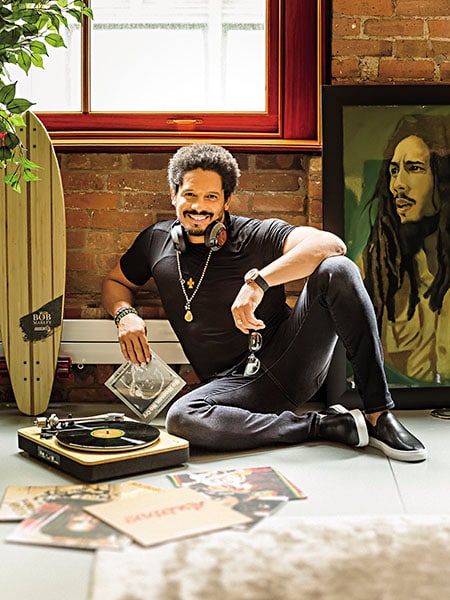
Bob Marley's green machine
Good vibes have never been more lucrative
 Photographer: Franco Vogt
Photographer: Franco VogtCreative Style Director: Joseph DeAcetis
Style assistants: Paris Toribio, Andres Chevalot Hoheb
Grooming: Segal Yehudai
The items on the king-bed-size coffee table in rohan marley’s living room in Manhattan’s Tribeca neighbourhood tell quite a story. There’s a marijuana grinder, a Bentley key and a $230 turntable made from bamboo and recycled waste—one of the latest offerings from the Earth-friendly audio outfit House of Marley.
“We believe in two things: Spiritual balance and material balance,” says Rohan, one of Bob Marley’s sons. The burly former Canadian Football League player now serves as the brand officer of his famous dad’s estate. “My father said that if you go to the well over and over again, the bottom will drop out. You have to start digging wells, man.” To that end, House of Marley sells its products in more than 48 countries. Two of its biggest hits: Get Together portable speakers (which logged $6 million in sales last year) and Smile Jamaica earphones ($8.1 million).
Rohan is one of a dozen or so heirs stirring up the Marley empire. (Bob’s three oldest children—Cedella, Stephen and Ziggy— also manage parts of the Marley empire; the rest sit on a board and share evenly in proceeds.) They run a posthumous powerhouse that tallied $23 million in earnings over the past year, fifth on our list of top-earning dead celebrities.
It’s a vast improvement over the past. After the singer’s death in 1981, the estate became mired in a years-long battle for control, with his widow, his producer and the Jamaican government, that was resolved in 1991. The financial situation had improved somewhat by 2007, but even then the Marleys were relying on a hodgepodge of middling licensing deals that brought in a meager annual income of $4 million.
They started to get serious around 2010, when they hired Alon Kaufman, co-founder of consumer-tech company HoMedics, to help run House of Marley. The company’s first offering, $39.99 Uplift earphones, hit stores the next year. The clan began to fiercely oppose unauthorised uses of Bob’s name and likeness—from unlicensed T-shirts to bobblehead dolls—and hired talent agency CAA to serve as the brand’s guardian.
Beyond House of Marley, Rohan pushes Marley Coffee (sold in Whole Foods and Walmart), while Cedella heads Marley Natural, a purveyor of herb-related products such as a sold-out $178 smoked-glass water pipe. Like the audio goods, all have an eco-friendly aspect. “You can’t win by price anymore,” says Jeri Yoshizu, who came over from Toyota to be House of Marley’s head of marketing. “[It’s] all about how is the brand going to stand out and what does it stand for.” Adds Rohan: “They say, ‘Oh, the Marleys—they sing about love and peace and everything! They’ll survive!’ No, come on, man, that’s rubbish. You need capitalism.”
(This story appears in the 30 November, -0001 issue of Forbes India. To visit our Archives, click here.)
X




